May 16, 2024 | 21:44 GMT +7
May 16, 2024 | 21:44 GMT +7
Hotline: 0913.378.918
May 16, 2024 | 21:44 GMT +7
Hotline: 0913.378.918
We have visited and talked to Mr. Le Van Hung, Director of My Thanh Nam Agricultural Service Cooperative in My Thanh Nam commune, Cai Lay district, Tien Giang province.
He stated that the unit's 100 hectares of rice are farmed following GlobalGAP standards, with 50 hectares certified with SRP (Sustainable Rice Platform) and meeting all requirements for export to Europe. What excites Mr. Hung is that the price of SRP rice from the summer-autumn crop will be traded 15 percent higher than the market price by an underwriting firm (ADC company). This highlights the excellent results of the cooperative's long-term collaboration with the ADC company.
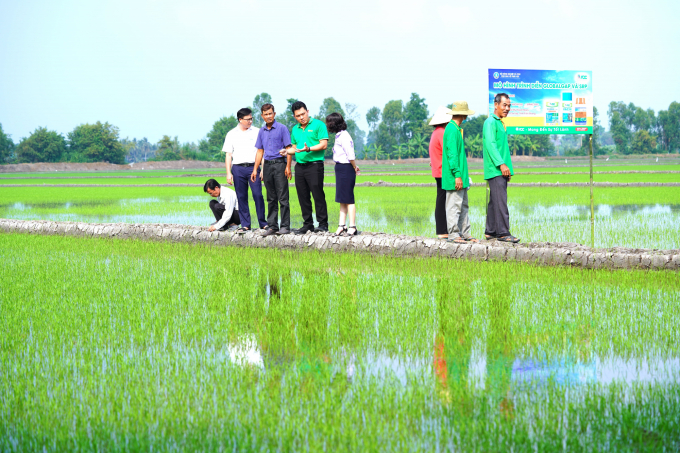
The model of "Dream rice paddies" of 100 hectares according to the GlobalGAP process is deployed at My Thanh Nam Cooperative, Cai Lay District, Tien Giang Province. Photo: Minh Dam.
Rather than conventional farming practices such as dense sowing and overuse of pesticides... Farmers in the My Thanh Nam cooperative were keen to adopt new farming methods. Since 2009, cooperative members have been required to farm rice following GlobalGAP standards. Additionally, the unit established a safe production and consumption connection with ADC, which supplies agricultural input materials and underwrites the output. Farmers that participate in the model adhere closely to the production process, including the use of pesticides according to the company's instructions.
Currently, the Company's organic-inorganic combination fertilizer formula has resulted in excellent efficiency. According to this formula, individuals may replace DAP fertilizer with organic fertilizer by applying the same amount (DAP is more expensive than organic fertilizer, costing around VND 800-900 thousand/bag). Each hectare may save up to VND 1.7 million in fertilizer costs by replacing two bags of DAP (100kg).

The specialized agencies of Tien Giang province and the Plant Protection Department have been regularly checking and evaluating to replicate the model. Photo: Huu Duc.
Farmers in My Thanh Nam Cooperative earned a significant profit margin on the winter-spring harvest of 2022, owing to a 10% increase in the selling price and low fertilizer expenses.
The ADC company has implemented the "Dream rice paddies" model in several localities throughout Hau Giang province and the Mekong Delta region, resulting in several excellent effects. The most usual is the fertilizer formula combining inorganic and organic components that the Company transfers, showing adaptability to the current situation of escalating fertilizer prices. Since then, farmers have responded well to the use of a combination of inorganic and organic fertilizers in rice farming.
Mr. Nguyen Van Thanh, Director of My Trung Cooperative (Cai Be district, Tien Giang province), stated that the cooperative began collaborating with ADC in 2019. Due to the rising costs of fertilizers, farmers are increasingly turning to inorganic fertilizers as a substitute for DAP.
Over 130 hectares of rice in the unit have received combined organic fertilization in lieu of DAP in recent years. Additionally, other farmers in neighboring communes and provinces placed cooperative orders for ADC Company's Con bo sua fertilizer, which is in high demand throughout the summer-autumn crop.
From the winter-spring rice crop of 2021 (November 2021) through the summer-autumn rice crop of 2022 (July 2022), the model of rice production utilizing biosafety pesticides was implemented in Tien Giang following the program agreed by the Food Protection Department materials and ADC Company.
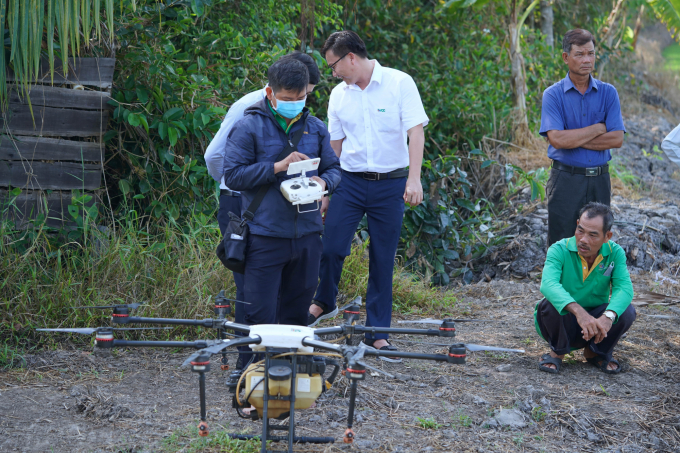
The technical staff of ADC Company prepares Drone to spray pesticides in the field. Photo: Minh Dam.
At My Thanh Nam Cooperative, a model named "Dream rice paddies" is being implemented under GlobalGAP and SRP processes on a 100-hectare scale. Initially, the concept resulted in excellent efficiency, and farmers felt quite secure in their jobs. Accordingly, ADC Company has assisted and led farmers in selecting and using pesticides that are approved on the list, biological pesticides that are safe for human consumption, and friendly to the natural environment. Silsau 6.5, Vacin 5SL, and Efphe 25EC were utilized as biological pesticides in the model.
Farmers have been delighted since the model of applying biopesticides to rice plants was conducted. According to farmers engaging in the model, the long-term collaboration between ADC and farmers has resulted in several benefits for the latter, including price assistance, underwriting for output, increased profitability, and safeguarding farmers' health...
Mr. Le Van Hung, Director of My Thanh Nam Agricultural Service Cooperative, stated: "It is certain that the model would be integrated with ADC Company. ADC focuses on advising farmers to avoid pesticide use to ensure their safety and efficacy and sends technical staff to inspect paddies once every seven to ten days.
The company assists farms in killing pests using drones at a minimal cost. It is mechanized from seeding through harvesting. Farmers may avoid direct contact with chemicals thanks to drones".
Mr. Nguyen Hoang Chi, Deputy Marketing Director of ADC Company, explained that the company invests in input expenses for farmers like Vietnamese rice seeds, fertilizers, biological pesticides, and drone technology (unmanned aircraft).
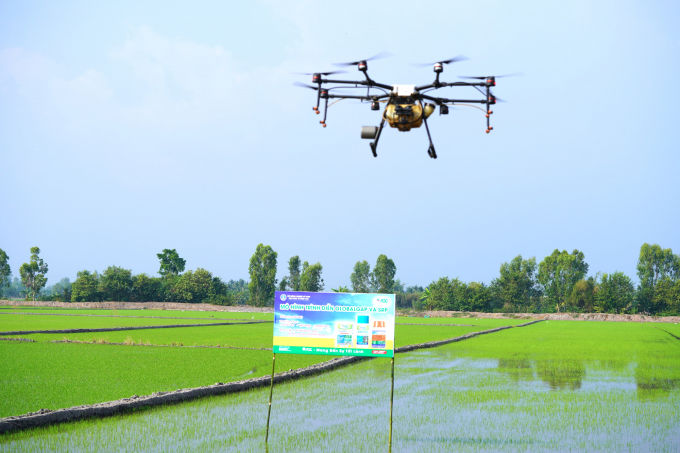
Thanks to Drone spraying pesticides, farmers are no longer directly exposed to pesticides. Photo: Huu Duc.
Simultaneously, teach and advise individuals on the safe and effective application of pesticides; Technical personnel visits the field regularly to assess the pest condition to rapidly deliver pesticides and help farmers in spraying pesticides using Drones.
Chi noted that for the previous harvest, the business signed contracts and underwrote products for farmers who participated in the model at rates that were 10-15 percent higher than market pricing. Beginning with the summer-autumn harvest of 2022, the production region has been recognized SRP, and the company will acquire products at a 15% higher than market pricing.
As of March 2022, the Plant Protection Department signed contracts with 12 pesticide manufacturers under the program "Guidelines for safe and effective pesticide usage; boosting the development and use of biological pesticides in the period 2021-2025," which included ADC Co., Ltd.
Ms. Bui Thanh Huong, Head of the Plant Protection Office (Plant Protection Department), stated: "This is an excellent example of pesticide application that is both safe and effective." According to ADC Company's assessment, this strategy employs up to 56% biological pesticides. Thus, the use of biological pesticides will have no adverse effect on human health or the field's natural environment.
The use of biological pesticides in rice farming has aided in the production of rice that is of high quality and safe for consumption and export, while also safeguarding farmer health and contributing to the protection of the living environment. According to Ms. Bui Thanh Huong, the approach benefits participating farmers economically and health-wise, and as such, it should be improved and replicated.
According to the agreement reached between enterprises and the Plant Protection Department about the promotion of biological pesticide manufacturing and usage between 2021 and 2025: By 2025, over 400,000 farmers will have received training; 15,000 agents will have received instruction on the safe and effective use of pesticides. 1,300 tanks and storage tanks, as well as the collection and processing of pesticide packing after use will be constructed. Deploying and constructing models on about 179,000 hectares of rice, pepper, coffee, tea, fruit trees, and vegetables. Additionally, the commitment to scale up manufacturing, create new products, and boost the usage of biological pesticides will grow by around 23% by 2025.
Translated by Linh Linh
/2024/05/16/2455-1-111202_165.jpg)
(VAN) Artemia eggs originating in Vinh Chau (Bac Lieu) are assessed by customers to have the best quality in the world; however, domestic production output only accounts for 1%.
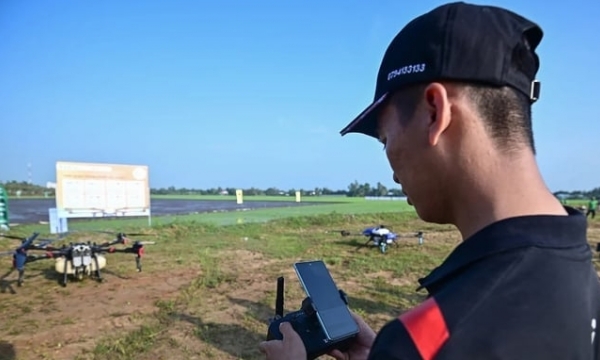
(VAN) Deputy Permanent Chairman of the National Committee for Digital Transformation Tran Luu Quang chaired the symposium on 'Promoting digital transformation of agriculture,' held on May 14.
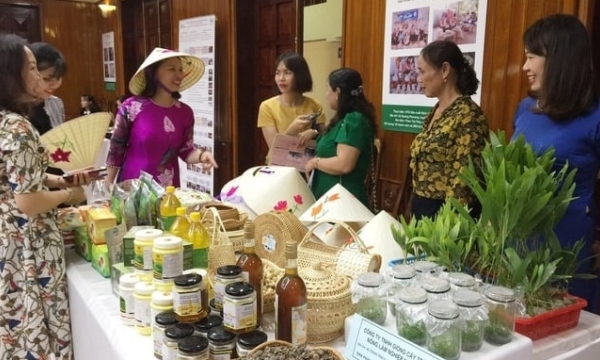
(VAN) After seven years of implementation, the Commercial Smallholder Support Project (CSSP) successfully aided numerous local households in escaping poverty, with multiple infrastructure projects initiated across Bac Kan province.
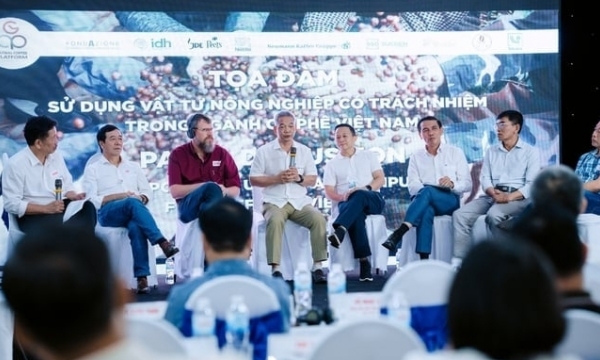
(VAN) The Global Coffee Platform (GCP) recently hosted a multi-stakeholder panel discussion on responsible use of agro-inputs in coffee production in Vietnam
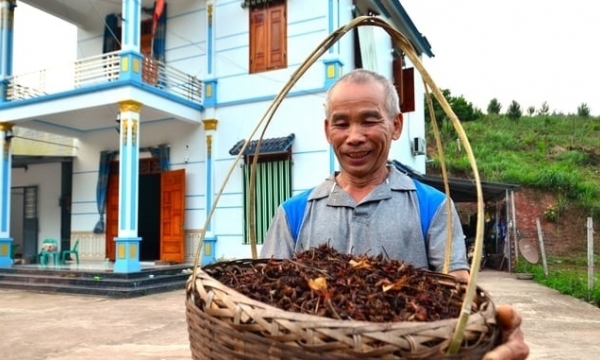
(VAN) Vietnam's Agriculture Newspaper engaged in a discussion regarding forest-based economic initiatives with Mr. Nguyen Huu Hung, General Director of Lang Son's Sub-Department of Forest Protection.
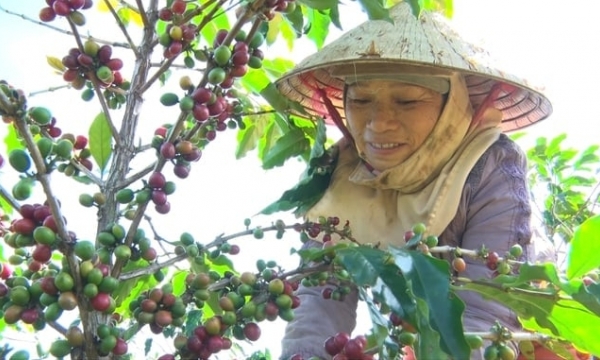
(VAN) The project is expected to increase the average income by 40% for approximately 2,000 coffee-growing households in the conversion of 2,500 ha.
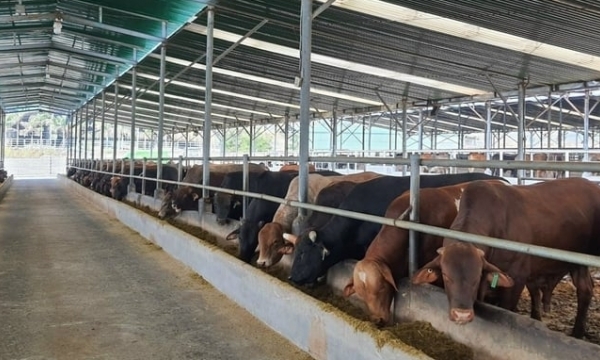
(VAN) The Animal Husbandry Association of Vietnam proposed the incorporation of the livestock sector and facilities in the current greenhouse gas inventory list.